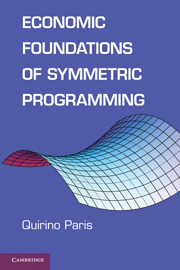‘I am thrilled to see Professor Paris put his knowledge of symmetric programming in print. The range of economic models that can be cast in this framework is virtually unlimited. In addition, the symmetric programming approach leads to a deeper understanding of economic principles as well as derivation of practical decision rules for policy makers and businesspeople.’
Ken Foster - Purdue University
‘Dr Paris has assembled a systematic treatment of the subject of symmetric programming. His development of the material offers valuable insight for students of economics at multiple levels, whether their bent is theoretical or applied. For researchers, the wealth of detailed examples in the text and appendix provide a great jumping-off point for more specialized computational models of economic analysis.’
Roman Keeney - Purdue University
‘Finally, a mathematical programming book with substantive economic content. This book will provide the foundation for our profession to revisit the core principle of ‘symmetry’ in all of our economic modeling efforts. Professor Paris, bravo!’
Gordon Rausser - University of California, Berkeley
‘Quirino Paris has written a book that few others could have written. Symmetry is widely and successfully used in many analyses in natural sciences, and the question of what symmetry can offer to economic analysis therefore begs an answer. Quirino Paris starts his exposition by rooting the issues to the philosophy of science, then utilizing the symmetry concepts to make classical and new problems in economics more operational. For example, monopolist behavior is analyzed for multiple commodities, motivated from the observation that monopolists often exercise their market power on more than one commodity or product. Example GAMS code files on several topics contribute to making the book more than beautiful; it becomes very useful.’
Eirik Romstad - Norwegian University of Life Sciences, and past president, European Association of Agricultural Economists
‘Mathematical programming approaches applied to a broad range of economic problems are experiencing resurgence, and Quirino Paris’s Economic Foundations of Symmetric Programming is a major contribution in this direction. This book sets itself apart as it interweaves economic theory with mathematical programming frameworks. It will serve also as a useful reference for the foundations of optimization (Lagrangean and Karash–Kuhn–Tucker approaches) and for perspectives on primal-dual problems in economics, all the while emphasizing the computational implementation of the theory with the addition of GAMS and other numerical routines. Overall, this book offers an uncommon (and innovative) approach from the perspective of the conventional literature, even though the themes covered are mainstream economic notions and theories.’
Spiro E. Stefanou - Pennsylvania State University





